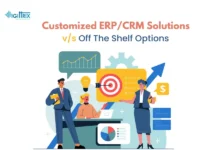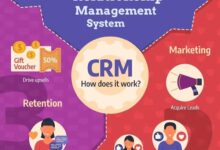AI-Powered CRM Software: Revolutionizing Customer Relationship Management
At the forefront of modern business operations lies AI-Powered CRM Software, a transformative tool reshaping customer relationship management with unparalleled efficiency and innovation. Dive into a world where AI meets CRM, promising a dynamic and personalized approach to customer interactions.
Introduction to AI-Powered CRM Software
AI-Powered CRM software refers to customer relationship management platforms that utilize artificial intelligence to streamline and enhance various aspects of customer interactions and data management. In today’s digital age, AI has become a crucial tool for businesses looking to improve customer relationship management processes.
Significance of AI in CRM
AI enhances customer relationship management processes by automating repetitive tasks, analyzing vast amounts of data to derive insights, and providing personalized interactions with customers. This results in improved efficiency, better decision-making, and enhanced customer satisfaction.
Benefits of Integrating AI into CRM Solutions
- Improved efficiency and productivity
- Enhanced customer experiences
- Personalized interactions
- Advanced data analysis and forecasting
- Cost savings through automation
Key Features of AI-Powered CRM Software
- Lead scoring and prioritization
- Predictive analytics for sales forecasting
- Natural language processing for customer interactions
- Machine learning algorithms for data analysis
Industries Benefiting from AI-Powered CRM Solutions
Various industries such as e-commerce, healthcare, finance, and telecommunications can benefit from AI-Powered CRM solutions to optimize customer relationships, improve sales processes, and drive business growth.
Personalizing Customer Interactions with AI
AI enables businesses to personalize customer interactions by analyzing customer data, predicting preferences, and delivering tailored recommendations or offers. This level of personalization leads to higher customer engagement and loyalty.
Role of Data Analytics in AI-Powered CRM Software
Data analytics plays a crucial role in AI-Powered CRM software by processing and interpreting vast amounts of customer data to uncover patterns, trends, and insights that can be used to enhance decision-making and customer experiences.
Impact of AI on Sales Forecasting and Lead Management
AI revolutionizes sales forecasting and lead management in CRM by providing accurate predictions, identifying potential leads, and prioritizing opportunities based on data analysis. This results in more effective sales strategies and increased revenue.
Implementing AI-Powered CRM Software Effectively
- Define clear objectives and goals
- Ensure data quality and integrity
- Provide adequate training for staff
- Regularly monitor and evaluate performance
- Iterate and optimize processes based on insights
Features of AI-Powered CRM Software
AI-powered CRM software offers a range of features that set it apart from traditional CRM systems. These features leverage artificial intelligence algorithms to enhance data analysis, automate tasks, and provide personalized customer experiences.
AI Algorithms for Data Analysis and Customer Insights
AI algorithms in CRM software can analyze large volumes of data quickly and efficiently, providing valuable insights into customer behavior, preferences, and trends. This data analysis helps businesses make informed decisions and tailor their strategies to meet customer needs.
Automation of Tasks
AI automates tasks like lead scoring, email marketing campaigns, and customer segmentation, saving time and resources for businesses. By automating these processes, AI-powered CRM software enables teams to focus on more strategic initiatives and improve overall efficiency.
Enhanced Personalized Customer Experiences
AI enhances customer experiences by enabling businesses to deliver personalized interactions based on individual preferences and behaviors. For example, AI can recommend products, send targeted messages, and provide proactive support, creating a more engaging and tailored experience for customers.
Natural Language Processing (NLP) for Sentiment Analysis
NLP in AI-powered CRM software allows businesses to analyze customer interactions, feedback, and sentiment in real-time. By understanding and interpreting language, businesses can address customer needs more effectively, improve communication, and enhance overall satisfaction.
Machine Learning for Predicting Customer Behavior
Machine learning algorithms in CRM systems can predict customer behavior and trends by analyzing historical data and identifying patterns. This enables businesses to anticipate customer needs, personalize offerings, and optimize marketing strategies for better engagement and retention.
Implementation of AI in CRM Systems
AI integration in CRM systems involves leveraging advanced technologies to enhance customer relationship management. This process brings about various benefits but also poses challenges that require careful consideration.
Examples of AI Integration in CRM Systems
- AI-powered lead scoring to prioritize sales opportunities.
- Natural language processing for sentiment analysis in customer interactions.
- Machine learning algorithms for personalized product recommendations.
Challenges and Considerations in Implementing AI in CRM Software
- Ensuring data privacy and security when utilizing AI algorithms.
- Integrating AI seamlessly with existing CRM infrastructure.
- Addressing potential biases in AI models that could impact decision-making.
Impact of AI on User Adoption and Training in CRM Implementations
- AI can streamline processes, leading to faster user adoption.
- Training programs are essential to help users understand and maximize AI features.
- Proper onboarding can increase user confidence in utilizing AI-driven CRM systems.
Detailed Comparison Between Traditional CRM Systems and AI-Integrated CRM Systems
- AI-integrated systems offer predictive analytics capabilities for better customer insights.
- Traditional systems rely more on manual data entry and lack AI-driven automation features.
- AI systems can adapt and learn from data, providing more accurate predictions and recommendations.
Role of Predictive Analytics in AI-Driven CRM Systems
- Predictive analytics uses historical data to forecast future trends and customer behavior.
- AI algorithms enhance the accuracy of predictions, helping businesses make informed decisions.
- By analyzing patterns, predictive analytics can anticipate customer needs and preferences.
Potential Benefits of AI-Powered Chatbots in CRM Platforms
- 24/7 customer support availability through AI chatbots.
- Personalized interactions based on customer data and preferences.
- Efficient handling of routine inquiries, freeing up human agents for complex issues.
Training Employees to Effectively Use AI Features in CRM Systems
- Develop comprehensive training materials that cover AI functionalities and best practices.
- Provide hands-on workshops to practice using AI tools within the CRM system.
- Offer continuous support and resources for employees to enhance their AI skills.
Case Studies of Successful AI Implementation in CRM Strategies
- Company X improved lead conversion rates by 30% after implementing AI-driven lead scoring in their CRM system.
- Company Y enhanced customer satisfaction by 20% through personalized recommendations using AI algorithms.
- Company Z reduced response times by 50% by integrating AI chatbots for customer inquiries in their CRM platform.
Personalization and Customer Experience
AI plays a crucial role in enhancing personalization in customer interactions within CRM platforms. By leveraging AI capabilities, businesses can analyze customer data, behaviors, and preferences to tailor their interactions, messages, and offers accordingly. This level of personalization leads to more engaging and meaningful customer experiences, ultimately fostering loyalty and satisfaction.
Role of AI in Improving Customer Experience
AI-driven CRM platforms utilize advanced algorithms to process vast amounts of customer data in real-time. This enables businesses to gain valuable insights into each customer’s preferences, purchase history, browsing behavior, and engagement patterns. By understanding customers on a deeper level, companies can deliver personalized recommendations, targeted marketing campaigns, and proactive customer service, resulting in a seamless and tailored experience for each individual.
- AI-powered chatbots: Chatbots equipped with AI technology can engage with customers in natural language, providing instant support, personalized recommendations, and assistance in real-time.
- Dynamic content generation: AI algorithms can analyze customer data to create personalized content, such as product recommendations, email campaigns, and website experiences tailored to each individual’s preferences.
- Predictive analytics: AI enables businesses to predict customer behavior, such as likelihood to churn, purchase propensity, or preferred communication channels. This allows companies to proactively address customer needs and concerns, enhancing overall satisfaction.
Data Management and Analytics
AI-Powered CRM software revolutionizes data management and analytics by leveraging artificial intelligence to handle and analyze large volumes of customer data efficiently. By automating processes and utilizing advanced algorithms, AI enhances the overall CRM experience for businesses.
Role of AI in Predictive Analytics
AI plays a crucial role in predictive analytics for customer behavior and trends within CRM systems. By analyzing historical data and patterns, AI algorithms can predict future customer actions, preferences, and trends. This enables businesses to anticipate customer needs and tailor their marketing strategies effectively.
Improving Data Accuracy and Decision-Making
AI improves data accuracy and decision-making in CRM systems by identifying patterns and insights that human analysis may overlook. AI algorithms can detect anomalies, clean up data inconsistencies, and provide valuable insights for informed decision-making. This leads to more precise targeting and personalized customer interactions.
Data Segmentation using AI Algorithms
AI algorithms in CRM systems facilitate the process of data segmentation by categorizing customers based on various attributes and behaviors. By segmenting data effectively, businesses can create targeted marketing campaigns, personalized messages, and tailored offers to enhance customer engagement and retention.
Machine Learning Techniques for Sentiment Analysis
Machine learning techniques are used for sentiment analysis in CRM software to analyze customer feedback, reviews, and interactions. By understanding customer sentiments and emotions, businesses can gauge customer satisfaction levels, identify potential issues, and improve overall customer experience. This helps businesses proactively address customer concerns and strengthen customer relationships.
Integration Capabilities with Other Software
Integrating AI-Powered CRM systems with other business applications is crucial for maximizing efficiency and streamlining operations. Let’s explore how this integration process works and the benefits it brings.
Configuring Integration with Marketing Automation Tools
Setting up integration between AI-Powered CRM systems and marketing automation tools involves the following steps:
- Identify the marketing automation tool you want to integrate with the CRM system.
- Access the settings or integration options within both the CRM and marketing automation platforms.
- Follow the specified instructions to establish a connection between the two systems.
- Map out the data fields that need to sync between the CRM and marketing automation tool.
- Test the integration to ensure data flows smoothly and accurately between the systems.
Advantages of Connecting AI-Powered CRM with ERP Systems
Integrating AI-Powered CRM with ERP systems offers various benefits, including:
- Enhanced data synchronization across departments for a unified view of customer information.
- Streamlined operations and improved workflow efficiency through automated data transfer.
- Better decision-making capabilities with access to real-time data from both CRM and ERP systems.
- Reduced manual data entry and minimized errors in data processing.
Impact of Integrating AI-Powered CRM with Helpdesk Software
A case study showcasing the impact of integrating AI-Powered CRM with helpdesk software revealed significant improvements in customer service efficiency. By connecting the CRM system with helpdesk software, the organization experienced:
– Faster response times to customer queries and issues.
– Personalized customer interactions based on historical data and preferences.
– Seamless ticket management and resolution tracking for enhanced customer satisfaction.
– Improved overall customer experience and loyalty due to efficient problem resolution.
Automation and Workflow Efficiency
Automation plays a crucial role in enhancing workflow efficiency within CRM software powered by AI. By automating routine tasks and processes, AI enables organizations to streamline operations and allocate resources more effectively.
Impact of AI-Driven Automation
- AI-driven automation significantly reduces the manual effort required to handle repetitive tasks such as data entry, lead scoring, and email communication.
- Automated workflows ensure that processes are executed consistently and without errors, leading to improved accuracy and faster response times.
- By freeing up employees from mundane tasks, AI-powered automation allows them to focus on more strategic activities that add value to the organization.
Scalability of AI-Powered Automation
- AI-powered automation in CRM systems is highly scalable, making it suitable for businesses of all sizes, from startups to large enterprises.
- As businesses grow, AI can adapt and scale with them, accommodating increased data volumes and expanding customer bases without compromising performance.
- The flexibility of AI-driven automation allows organizations to customize workflows based on their unique requirements, ensuring optimal efficiency and productivity.
Security and Privacy Considerations
Data security and privacy are crucial aspects of any CRM system, especially those powered by AI. These systems handle vast amounts of sensitive customer information, making it essential to prioritize security measures and compliance with data protection regulations.
Enhanced Security Measures with AI
AI-powered CRM solutions offer advanced security features that help protect customer data from potential threats. By leveraging AI algorithms, these systems can detect and respond to security breaches in real-time, ensuring data integrity and confidentiality. Additionally, AI can analyze patterns and anomalies in data to identify any suspicious activities, enhancing overall security measures.
Best Practices for Data Protection Compliance
- Implement robust encryption protocols to secure data both at rest and in transit.
- Regularly update and patch CRM systems to address any vulnerabilities and ensure optimal security.
- Restrict access to sensitive customer information to authorized personnel only, implementing role-based access controls.
- Provide comprehensive training to employees on data security best practices and compliance with regulations.
- Conduct regular audits and assessments to evaluate the effectiveness of security measures and identify areas for improvement.
Customization and Scalability
Customization and scalability are crucial aspects of AI-powered CRM software that enable businesses to tailor their systems to specific needs and handle growing demands efficiently.
Customizing AI Algorithms in CRM Software
Customizing AI algorithms in CRM software involves analyzing business requirements, identifying key metrics, and fine-tuning algorithms to align with the organization’s goals. By adjusting parameters, training data, and models, businesses can optimize AI capabilities to enhance customer interactions and streamline CRM processes.
Automating Personalized Customer Interactions
AI plays a pivotal role in automating personalized customer interactions by leveraging data insights to anticipate customer needs, preferences, and behaviors. Through AI-driven recommendations, targeted marketing campaigns, and predictive analytics, businesses can deliver tailored solutions that enhance customer satisfaction and loyalty.
Configuring AI Models for CRM Modules
To configure AI models for different CRM modules, businesses should first identify the modules requiring AI integration, map out data flows, and establish performance benchmarks. By selecting appropriate AI tools, defining training objectives, and validating model accuracy, organizations can effectively implement AI across various CRM functions.
Importance of Scalability in AI-powered CRM Systems
Scalability is vital for AI-powered CRM systems to accommodate increasing data volumes, user interactions, and business growth. By ensuring scalability, organizations can maintain system performance, data integrity, and user experience while adapting to evolving market demands and technological advancements.
Comparing Scalability Features of AI CRM Platforms
Different AI CRM platforms offer varying scalability features in terms of performance optimization, resource allocation, and flexibility. Businesses should evaluate platform scalability based on factors like data processing speed, storage capacity, and integration capabilities to determine the most suitable solution for their needs.
Case Studies on Scaling CRM Operations with AI Technology
Numerous organizations have successfully scaled their CRM operations using AI technology to enhance customer engagement, streamline processes, and drive business growth. Case studies showcasing how companies leveraged AI for personalized marketing, predictive analytics, and customer segmentation can provide valuable insights into the benefits of scaling CRM operations with AI technology.
Industry Applications and Use Cases
AI-Powered CRM software has revolutionized the way businesses across various industries interact with their customers. By leveraging artificial intelligence, CRM systems can offer personalized experiences, streamline workflows, and drive better decision-making. Let’s explore the diverse industry applications and real-world use cases of AI-Powered CRM software.
Retail and E-commerce
AI-Powered CRM software has transformed the retail and e-commerce industry by enabling businesses to analyze customer data, predict preferences, and personalize marketing campaigns. For example, an online clothing store can use AI algorithms to recommend products based on past purchases and browsing behavior, increasing sales and customer satisfaction.
Healthcare
In the healthcare sector, AI-Powered CRM systems are being used to improve patient engagement, optimize care delivery, and enhance overall patient experience. Healthcare providers can utilize AI to segment patients based on their health needs, send automated reminders for appointments, and provide personalized treatment recommendations, leading to better health outcomes.
Financial Services
Financial institutions have also embraced AI-Powered CRM software to enhance customer service, detect fraud, and improve risk management. By analyzing transaction data and customer behavior patterns, banks can identify potential fraudulent activities in real-time and offer personalized financial advice to clients, increasing trust and loyalty.
Telecommunications
In the telecommunications industry, AI-Powered CRM systems are used to enhance customer support, optimize network performance, and analyze customer feedback. Telecom companies can leverage AI to automate customer inquiries, predict network outages before they occur, and analyze sentiment from customer interactions to improve service quality.
Travel and Hospitality
AI-Powered CRM software has revolutionized the travel and hospitality sector by enabling companies to offer personalized recommendations, streamline booking processes, and enhance guest experiences. Hotels can use AI algorithms to customize room preferences, offer personalized promotions, and provide real-time assistance to guests, ultimately increasing customer loyalty and satisfaction.
Vendor Landscape and Market Trends
In the competitive landscape of AI-Powered CRM software, it is essential to analyze the key players in the market and the trends shaping the industry.
Leading Vendors Comparison
- Salesforce: A pioneer in CRM, Salesforce offers AI capabilities through Einstein, providing predictive insights and personalized recommendations.
- Microsoft Dynamics 365: Leveraging Azure AI, Dynamics 365 offers advanced analytics and automation features for enhanced customer engagement.
- Oracle CX Cloud: Oracle’s AI-driven CX Cloud enables businesses to deliver tailored customer experiences through data-driven insights.
- SAP Sales Cloud: SAP’s Sales Cloud utilizes AI to streamline sales processes, optimize lead management, and improve customer interactions.
- Zoho CRM: Zoho CRM incorporates AI features for lead scoring, email sentiment analysis, and workflow automation to enhance productivity.
Emerging Trends in AI Technology
Natural language processing (NLP) and machine learning algorithms are revolutionizing CRM software development by enabling chatbots, sentiment analysis, and voice recognition to enhance customer interactions and insights.
Market Dynamics and Competition
SWOT Analysis:
| Strengths | Weaknesses |
| Advanced AI capabilities | Integration challenges |
| Scalability and customization | Data privacy concerns |
| Opportunities | Threats |
| Market expansion in AI | Competition from new entrants |
Impact of Data Privacy Regulations
Customer data privacy regulations such as GDPR and CCPA are influencing the development and adoption of AI-powered CRM software by emphasizing the need for transparent data handling, consent management, and security measures.
Return on Investment (ROI) and Business Impact
Implementing AI-Powered CRM software can have a significant impact on a business’s ROI by enhancing operational efficiency, improving customer relationships, and driving revenue growth. Let’s delve into how AI contributes to the overall business impact.
Revenue Growth
AI-Powered CRM software enables businesses to analyze customer data more effectively, identify trends, and personalize marketing strategies. This targeted approach can lead to increased sales and revenue generation. Additionally, AI can optimize pricing strategies, recommend cross-selling opportunities, and predict customer behavior, all of which contribute to revenue growth.
- AI algorithms can analyze customer behavior patterns to identify upsell and cross-sell opportunities, leading to increased sales.
- Personalized recommendations based on customer preferences can drive repeat purchases and customer loyalty.
- AI-driven predictive analytics can forecast market trends and customer demand, helping businesses stay ahead of the competition.
Cost Savings
By automating repetitive tasks, streamlining processes, and improving resource allocation, AI-Powered CRM software can help businesses reduce operational costs and increase efficiency.
- Automating customer support through AI chatbots can lower customer service costs while improving response times.
- AI can optimize inventory management, reduce excess stock, and minimize wastage, leading to cost savings.
- Predictive maintenance powered by AI can prevent equipment breakdowns, reducing maintenance costs and downtime.
Customer Retention
AI plays a crucial role in enhancing customer experience, personalizing interactions, and addressing customer needs promptly. This, in turn, improves customer satisfaction and loyalty, leading to higher retention rates.
- AI-powered sentiment analysis can help businesses gauge customer satisfaction levels and address issues proactively.
- Personalized recommendations and offers based on AI insights can foster stronger relationships with customers and increase retention.
- AI-driven customer segmentation can target specific customer groups with tailored messaging, improving engagement and retention.
Future Outlook and Innovations
Artificial Intelligence (AI) has been rapidly transforming the customer relationship management (CRM) landscape, and the future outlook for AI-powered CRM software is filled with exciting possibilities. As technology continues to evolve, here are some predictions for the future developments and innovations in AI-powered CRM software.
Potential of AI Advancements in CRM
AI advancements such as natural language processing (NLP) and image recognition are expected to revolutionize the way CRM systems interact with customers. NLP capabilities will enable CRM software to understand and respond to customer queries in a more human-like manner, enhancing the overall customer experience. On the other hand, image recognition technology can be utilized to analyze customer behavior and preferences based on visual data, allowing for more personalized interactions and targeted marketing strategies.
Impact of AI on the Future of CRM
AI is poised to shape the future of customer relationship management by enabling businesses to achieve a deeper level of customer understanding and engagement. With AI-powered CRM software, organizations can leverage predictive analytics and machine learning algorithms to anticipate customer needs, automate routine tasks, and deliver hyper-personalized experiences at scale. This proactive approach to customer relationship management is expected to increase customer loyalty, drive revenue growth, and foster long-term relationships with customers.
Integration of AI Across CRM Functions
In the future, AI is likely to be seamlessly integrated across all CRM functions, including sales, marketing, and customer service. This holistic approach will enable businesses to have a unified view of customer data and interactions, leading to more informed decision-making and improved operational efficiency. AI-powered CRM systems will also facilitate real-time data analysis, enabling businesses to respond quickly to changing market dynamics and customer preferences.
Summary
As we conclude this insightful journey into AI-Powered CRM Software, it’s evident that the future of customer relationship management is intricately linked with the advancements of AI technology. Embrace the possibilities, harness the power of data, and elevate your CRM strategies to unprecedented heights.




